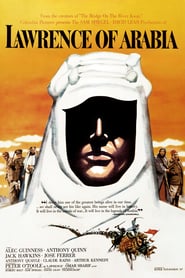
The definition of what is an epic motion picture is a matter of interpretation. Some people connect this with the length of a film. Wikipedia defines it as a style of filmmaking with large scale, sweeping scope, and spectacle. For me an epic motion picture is a film that deals with an historic time and events, that has a true-life heroic figure at its epicenter. David Lean’s, “Lawrence of Arabia”, meets all these criteria to a tee and in my opinion is the greatest epic ever made. Its greatness comes from the movies’ combination of fascinating character study, superb acting and beautiful photographic rendering. The hero is T.E. Lawrence, who was a British Archeologist, army officer, diplomat and writer. His memoirs about the Arab revolt during World War 1 against the Turks are the basis of the film. Lawrence, the historic figure, allied with Emir Faisal in forming the Arab revolt that eventually drove the Turks out of the Middle East. The movie deals with his part in the revolt. He was a man who never married leading to questions about his sexuality, and this is how Lean chose to depict him. It was impossible for Lean in 1962 to face the topic of Lawrence being gay straight out, but throughout the movie we are given hints. Such has his relationship he has with the two servant boys and his initial response to the sexual advances of his Turkish torturer. While the story is based on exotic locations and tumultuous events, the crux of the film is a character study of a polarizing and fascinating figure that gained the trust of the various Arab tribes. and was central in a victorious military campaign the result of which we are still feeling today. The actor who plays Lawrence was the then unknown British actor, Peter O’Toole and his performance is one of those transcendent type of portrayals that would forever typecast him throughout his fruitful career. O’Toole was able to convey a confident charismatic power with a gentle feminine gait to create an almost mythical figure. Before this film, T.E. Lawrence was just one of many historical figures from the first Great War, who had his adventures remembered through newspaper clippings and his own autobiographic novel. With this movie, he became, “Lawrence of Arabia”, being a demigod like leader of men. A flawed tormented human being, who, through sheer personality and will, served as a magnet within the desert sun’s sweltering heat. O’Toole had piercing blue eyes that were as expressive as they were stunning. He looked the part and his acting was subtle and powerful at the same time. It was clear to me why this man drew followers and not just because of the script. It was the presence that O’Toole gave his Lawrence that carries the movie. Without Peter O’Toole, there would be no epic feel to the story. This is exponentially more impressive when considering the brilliant supporting cast. I was a little bit peeved that only one of the main Arab characters was played by an actual Arab but in 1962 even this seemed like ahead of its time. The Egyptian heart throb Omar Sharif was this actor and his portrayal of Sherif Ali comes across as a temperamental hot headed typecast, which is a more insulting portrayal then those done by the non-Arabic actors. Alec Guinness, who was one of the most accomplished actors of his time, plays Prince Faisal with much more depth and dignity. His performance was so refined that it is claimed that people in Cairo he spoke to in character thought that he was the real Prince himself. It is an eloquent and respectful performance. It was however, the half Mexican actor Anthony Quinn who stole many scenes as the smart but ruthless Bedouin leader Auda Abu Tayi. Using his costume to great effect and brandishing his sword as if he was born with it, Quinn, who made a career playing ethnic roles in Hollywood movies was clearly enjoying himself, and I for one enjoyed watching him. David Lean was a seasoned expert filmmaker at the time of this production. He had previously brought the written words of dickens and others to the screen. Here he took an autobiography of a period in time and brought it to life by injecting visual splendor and perceived insight into the man who wrote about the events. Clearly Lean thought that to write so boastingly about such accomplishments of many required an egotistical psyche and that was how he portrayed the hero of the film. His vision resulted in many spectacular set pieces. Sharif appearing from an unfocused desert mirage as a speck, the shifting sand and light of the desert merging from a lighted match to spectacular wide screen battles. In addition to great script and superb acting, the movie is also a feast for the eyes that needs to be seen on a large screen. At almost four hours there are no wasted shots and my attention never lapsed. When the word Epic is used, this film is almost always mentioned due to the fact that it is not only an epic, but also a marvelous piece of film making.

